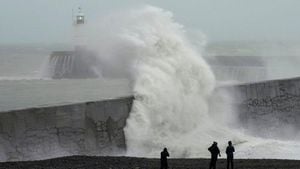Intel, the chipmaking giant, finds itself at the center of a controversy following the firing of one of its engineers, who alleges discrimination based on antisemitism and retaliation for reporting unsettling behavior from his boss. The unnamed engineer, who has opted to be referred to as John Doe, claimed he was dismissed from his role for bringing attention to his supervisor's offensive social media activity.
The suit, initiated against Intel and its vice president Alaa Badr, accuses Badr of openly endorsing antisemitism by liking social media posts glorifying violence against Israelis, particularly following the escalation of conflicts stemming from Hamas's October 7 assault on Israel. According to the lawsuit, Badr’s social media accounts included images and posts celebrating attacks against Israeli soldiers and civilians.
Badr's alleged online behavior deeply disturbed the plaintiff—a former member of the Israel Defense Forces (IDF)—who experienced personal loss and trauma when his family was threatened by Hamas rocket fire. The lawsuit claims Intel disregarded these concerns, relaying only the management's reassurance without taking genuine steps to rectify the situation.
Filing this suit, Doe argues he suffocated under the pressures of working for someone publicly aligned with groups hostile toward his identity and past. His family still resides in Israel, which amplifies his apprehensions about potential backlash against them.
The complaint describes the digital posts Badr engaged with, celebrating the deaths of Israeli military personnel and even using imagery celebrating brutal acts against them. “Praise be to God, the trampling was done. May God bless you, our Qassams!” read one of the posts Badr liked.
Badr, who presented himself as someone committed to bridging cultural divides, is depicted as having nurtured hostility instead. The legal documents portray his behavior transforming abruptly with the onset of renewed military conflicts, with Badr using his platform to advocate for violent sentiments against Israelis.
Following the October attacks by Hamas, antisemitic incidents surged across the United States, particularly significant within New York City. Reports show antisemitic incidents rose by 110% after the conflict intensified, with dedicated advocacy groups noting increases to alarming levels among Jewish communities.
Numerous reports documented assaults and vandalism targeted toward individuals perceived to be Jewish. The complexity of the current sociopolitical climate places additional stress on ex-IDF soldiers, like Doe, who may face increased risks of violence or harassment due to their military ties.
Upon reporting Badr's behavior to Intel's human resources department early this year, Doe saw no immediate remedy, leading him to become entangled in escalating tensions at the office. His concerns only heightened as he was compelled to report to Badr directly, which he deemed intolerable, considering the anti-Israel sentiments broadcasted by Badr following the outbreak of hostilities.
Further aggravation arose when Badr allegedly probed Doe about other Israeli employees at Intel, hinting at his discontent with the supposed concentration of Israelis among the workforce. This interaction raised the specter of discrimination, laying bare Doe's justified fears for safety and the respect owed to his experience.
Despite Badr’s public expression of solidarity with violent groups, Doe's situation culminated with Intel’s decision to terminate his employment under the guise of cost-cutting. His subsequent reassignment came with reduced pay and stripped bonuses, which Doe's legal team contends signified retaliatory motives.



